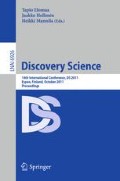Abstract
In this paper, we present an approach for compressing a rule-based pairwise classifier ensemble into a single rule set that can be directly used for classification. The key idea is to re-encode the training examples using information about which of the original rules of the ensemble cover the example, and to use them for training a rule-based meta-level classifier. We not only show that this approach is more accurate than using the same rule learner at the base level (which could have been expected for such a variant of stacking), but also demonstrate that the resulting meta-level rule set can be straight-forwardly translated back into a rule set at the base level. Our key result is that the rule sets obtained in this way are of comparable complexity to those of the original rule learner, but considerably more accurate.
Access this chapter
Tax calculation will be finalised at checkout
Purchases are for personal use only
Preview
Unable to display preview. Download preview PDF.
References
Andrews, R., Diederich, J., Tickle, A.B.: Survey and critique of techniques for extracting rules from trained artificial neural networks. Knowl.-Based Syst. 8(6), 373–389 (1995)
Asuncion, A., Newman, D.J.: UCI machine learning repository (2007), http://www.ics.uci.edu/~mlearn/MLRepository.html
van den Bosch, A.: Using induced rules as complex features in memory-based language learning. In: Proceedings of the 2nd Workshop on Learning Language in Logic and the 4th Conference on Computational Natural Language Learning, pp. 73–78. Association for Computational Linguistics, Morristown (2000)
Breiman, L.: Bagging predictors. Machine Learning 24(2), 123–140 (1996)
Cohen, W.W.: Fast effective rule induction. In: Prieditis, A., Russell, S. (eds.) Proceedings of the 12th International Conference on Machine Learning (ML 1995), pp. 115–123. Morgan Kaufmann, Lake Tahoe (1995)
Demsar, J.: Statistical comparisons of classifiers over multiple data sets. Journal of Machine Learning Research 7, 1–30 (2006)
Diederich, J.: Rule Extraction from Support Vector Machines. SCI, vol. 80. Springer, Heidelberg (2008)
Dietterich, T.G., Bakiri, G.: Solving multiclass learning problems via error-correcting output codes. Journal of Artificial Intelligence Research (JAIR) 2, 263–286 (1995)
Domingos, P.: Metacost: A general method for making classifiers cost-sensitive. In: Proceedings of the 5th ACM SIGKDD International Conference on Knowledge Discovery and Data Mining (KDD 1999), pp. 155–164. ACM, San Diego (1999)
Fürnkranz, J.: Integrative windowing. Journal of Artificial Intelligence Research 8, 129–164 (1998)
Fürnkranz, J.: Separate-and-conquer rule learning. Artificial Intelligence Review 13(1), 3–54 (1999)
Fürnkranz, J.: Round robin classification. Journal of Machine Learning Research 2, 721–747 (2002), http://www.ai.mit.edu/projects/jmlr/papers/volume2/fuernkranz02a/html/
Loza Mencía, E., Fürnkranz, J.: Efficient pairwise multilabel classification for large-scale problems in the legal domain. In: Daelemans, W., Goethals, B., Morik, K. (eds.) ECML PKDD 2008, Part II. LNCS (LNAI), vol. 5212, pp. 50–65. Springer, Heidelberg (2008)
Loza Mencía, E., Fürnkranz, J.: Efficient multilabel classification algorithms for large-scale problems in the legal domain. In: Francesconi, E., Montemagni, S., Peters, W., Tiscornia, D. (eds.) Semantic Processing of Legal Texts. LNCS (LNAI), vol. 6036, pp. 192–215. Springer, Heidelberg (2010)
Seewald, A.K.: How to make stacking better and faster while also taking care of an unknown weakness. In: Sammut, C., Hoffmann, A.G. (eds.) Proceedings of the 19th International Conference (ICML 2002), pp. 554–561. Morgan Kaufmann, Sydney (2002)
Ting, K.M., Witten, I.H.: Issues in stacked generalization. Journal of Artificial Intelligence Research 10, 271–289 (1999)
Witten, I.H., Frank, E.: Data Mining: Practical machine learning tools and techniques, 2nd edn. Morgan Kaufmann, San Francisco (2005)
Wolpert, D.H.: Stacked generalization. Neural Networks 5(2), 241–260 (1992)
Author information
Authors and Affiliations
Editor information
Editors and Affiliations
Rights and permissions
Copyright information
© 2011 Springer-Verlag Berlin Heidelberg
About this paper
Cite this paper
Sulzmann, JN., Fürnkranz, J. (2011). Rule Stacking: An Approach for Compressing an Ensemble of Rule Sets into a Single Classifier. In: Elomaa, T., Hollmén, J., Mannila, H. (eds) Discovery Science. DS 2011. Lecture Notes in Computer Science(), vol 6926. Springer, Berlin, Heidelberg. https://doi.org/10.1007/978-3-642-24477-3_26
Download citation
DOI: https://doi.org/10.1007/978-3-642-24477-3_26
Publisher Name: Springer, Berlin, Heidelberg
Print ISBN: 978-3-642-24476-6
Online ISBN: 978-3-642-24477-3
eBook Packages: Computer ScienceComputer Science (R0)

